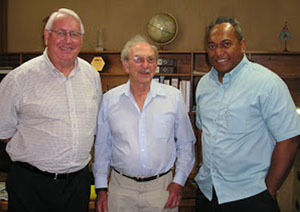
To my mind, a recent contempt of court oversight tells more about the shortage of senior staff and the stresses and strains of publishing anything that may be considered controversial than it does about the intent or honesty of the publisher and editor-in-chief of The Fiji Times. I left their office convinced of their personal integrity, and sad that some in government failed to recognise that this is not the old, antagonistic Fiji Times but a new Fiji Times trying to uphold the legitimate traditions of good journalism under difficult conditions.
OPINION: It's so easy to flick quickly though the news and accept what the journalist writes or says, often reporting the views of another, without taking time out to really think what it all means. The recent court sentence against The Fiji Times for contempt of court is a case in point. Most people have already made their mind up on the rights or wrongs of the case, and many will have had their prior opinions confirmed one way or another.
For those supporting the Bainimarama government, justice has been done and the Fiji Times got all it deserved. For government critics, this is further evidence of injustice and the lack of media freedom.
And for the politically undecided —and those who recognise that while one can question a judgement, no one, in any country, can question the integrity of the judge or the courts without the risk of appearing in court themselves—it would have been better had the case not come to court but since it did, the sentence was probably correct but the fine was excessive.
Coming on top of the political party registration kerfuffle and uncertainties about who will take part in the Constituent Assembly, the judgement certainly did not contribute to a calm atmosphere conducive to talanoa or dialogue.
The Pacific Freedom Forum, a regional grouping of media people, called it a "double whammy" but the two issues should be considered separately even though their outcomes may be similar. One is contempt of court; the other is restrictions on the old political parties because they did not meet the non-negotiable principles (notably insistence on race-based electorates and ongoing power to the unelected Great Council of Chiefs).
PFF co-chair Titi Gabi of Papua New Guinea said: "The verdict itself given the circumstances is clearly sending a warning on what the media can expect if they step one inch out of line, even by mistake ... We urge the regime to demonstrate its commitment to the free and fair component of democratic elections by allowing the media to be free in order to fairly do its job."
Interestingly, Gabi not too subtly infers that the judge's verdict was influenced by government, exactly the same contempt of court accusation that landed The Fiji Times in court. And to allow the media to keep reporting the opinions of the now de-registered parties, as if they still existed, will only add to discord and further uncertainty.
Race-based submissions
Whatever the motives or actions of the government, the submissions of the SDL and FLP show they do not want truly democratic elections. They wish to retain race-based electorates. The PFF think these recent events will result in media organisations returning to "censoring themselves heavily."
This is most likely given government touchiness and the clear intentions of the SDL and FLP to disrupt the dialogue process and undermine the work of the Constituent Assembly even before it has met. But it need not be if government can expose the muddled motives of the old political parties.
I understand where the court and the government are coming from, but I wonder if they have a fair and sufficient understanding of where The Fiji Times is coming from. I met with general manager and publisher Hank Arts and editor-in-chief Fred Wesley in late October. Yesterday I played back the recorded interview to see if it shed any light on The Fiji Times' position. I think it does.
There are two daily newspapers in Fiji - The Fiji Times and the Fiji Sun. The former is seen as anti-government; the latter as pro-government. Both protest this simple classification, each saying they are pro-Fiji but with a different approach to what is newsworthy.
Arts pointed to many areas in which the two papers co-operated while welcoming the competition between the papers. The Times has been disadvantaged with all government print advertising going to the Sun but Arts said revenue and circulation were holding up: "We'll get through. We have a responsibility to 160 staff and over 200 consultants."
A major problem confronting both papers, but particularly The Times, is the loss of many very senior staff attracted by higher wages and more assured security to private enterprises in Fiji and overseas. The Times takes on-the-job, overseas training and training placements for budding USP student journalists very seriously. Good work by staff is rewarded by further travel and training opportunities and by promotions but it will be a number of years before the skills and experience of lost senior staff are fully replaced.
Now under local ownership, The Times has been left loaded with some of the anti-government baggage of its former owners, Rupert Murdoch's Sydney-based News Limited.
'Nuisance factor'
"Unfortunately," said Arts, "government still sees us a nuisance factor. I don't believe we are and we've certainly tried not to be. We should be working hand in hand to move this country forward. We can make a difference." I could not agree more.
Both men insisted they have no bad feelings towards government. As journalists, they try to be unbiased and neutral. But as journalists, they also need to be a paper for everyone in Fiji.
In response to my comment that even pro-government people are critical of some government actions, Wesley stressed the importance of contributions from others in the community.
"If ten people agree and three don't, we have to give them the opportunity to say so. That's our role. We wish government would understand us. We have no beef with them."
Arts agreed, "We can't go backward. We've got to move on."
The intimacy of Fiji society came through when he added, "The PM and I get on well. He's great company. And our wives are friendly." I expressed the view that if government showed more trust, many more people would be more supportive." They agreed.
They spoke of their efforts to ensure that nothing published could be seen to contravene the Media Decree regulation. Even a normally straightforward story about a road not being repaired would be checked out by reporters.
Another story criticising an official that could be taken as libellous would be declined.
When this happened, informants, unaware of Fiji's libel laws, sometimes insisted they publish the story or said they would take it to the Fiji Sun.
Legal opinion
More important stories such as a critical but well balanced article or opinion from one of the NGOs or a former politician would be referred to their lawyers for a legal opinion before publication, or to a relevant government ministry for verification and comment. The situation has improved in recent months but some stories have been delayed and others not published at all because of doubts about how they may be viewed by government.
Very occasionally, despite these efforts, something would slip through. It may be a relatively small infringement like the omission of a byline but on one occasion under the present leadership a more serious oversight occurred: the re-publication of a statement in a New Zealand newspaper, the Sunday Star-Times, that the Fiji judiciary was not independent.
This is the case where the Fiji Times was recently found guilty of contempt of court and fined $300,000, and editor-in-chief Fred Wesley was fined $25,000 and given a six month jail sentence suspended for two years. We spoke only briefly of the the pending case back in October.
More recently, I asked why they did not immediately publish a retraction and apology. I was told they offered but by this time government was intent on pursuing the matter in court.
To my mind, the oversight tells more about the shortage of senior staff and the stresses and strains of publishing anything that may be considered controversial than it does about the intent or honesty of the CEO/publisher and editor-in-chief of The Fiji Times. I left their office convinced of their personal integrity, and sad that some in government failed to recognize that this is not the old, antagonistic Fiji Times but a new Fiji Times trying to uphold the legitimate traditions of good journalism under difficult conditions.
The same may be said of the government, of course. I have little doubt that they too are trying to uphold the traditions of good government under difficult conditions. I'd like to see Hank Arts and the PM relaxing with a bottle of Scotch Blue Label and not get up until they have a far better understanding of each other's difficulties. Even if they have to finish the bottle.
This work is licensed under a Creative Commons Attribution-NonCommercial 3.0 New Zealand Licence.




